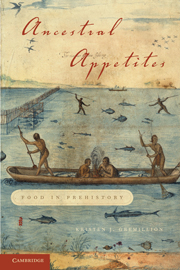Introduction
Published online by Cambridge University Press: 05 June 2012
Summary
every meal we eat tells an evolutionary tale whose beginnings go back to the origin of life itself. That hot dog you ate for lunch has a surprisingly rich history, one that reflects the cumulative wisdom of natural selection, a multitude of human decisions, and the structured flow of information that we call human culture. Pursuing the origins of your lunch is not easy, for the farther back you go in time, the more sparse and ephemeral the evidence. Cattle were domesticated at least 9,000 years ago, and the wheat in the bun even earlier. The original wild forms of wheat were coaxed by incipient farmers into producing greater yields over generations of planting, harvesting, and planting again. The grinding stones used to make flour represent the accumulated knowledge of generations of skilled workers who learned from their elders what stones to select and what forms to create, adding their own improvements to pass on to their children. Is it a kosher hot dog? Behind its manufacture lies a deep cultural tradition of ethnic pride and religious observance. Keep going backward in time, and you find your distant ancestors acquiring a taste for meat and perhaps devising ways to unearth tubers and crush seeds and nuts. Eventually you will arrive at the evolutionary novelty of eating itself – extracting energy not directly from the sun, but from organic matter. All of this history, and more, is embodied in even the most hurried and unreflective act of eating.
- Type
- Chapter
- Information
- Ancestral AppetitesFood in Prehistory, pp. 1 - 4Publisher: Cambridge University PressPrint publication year: 2011



